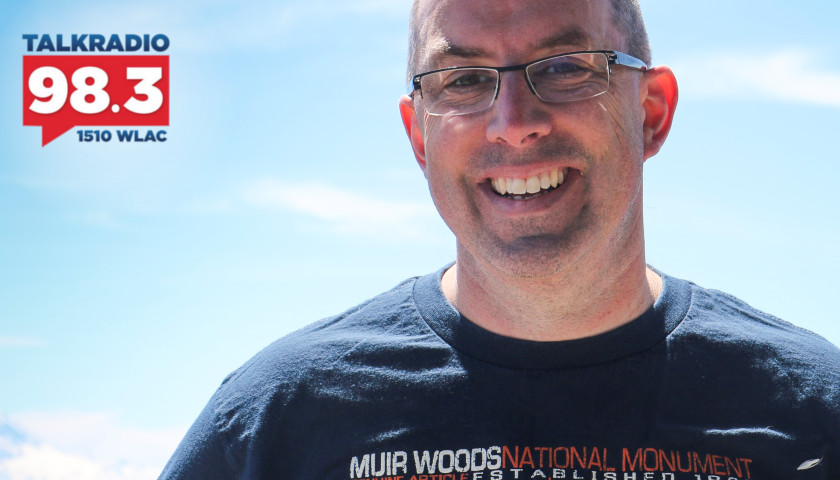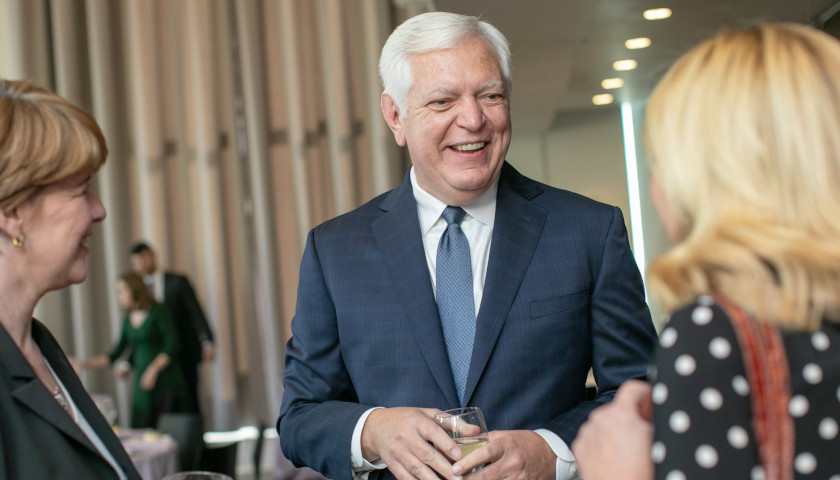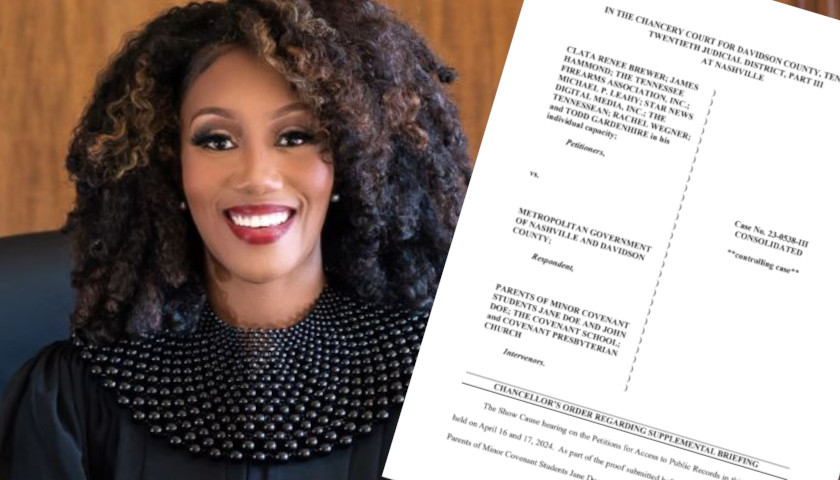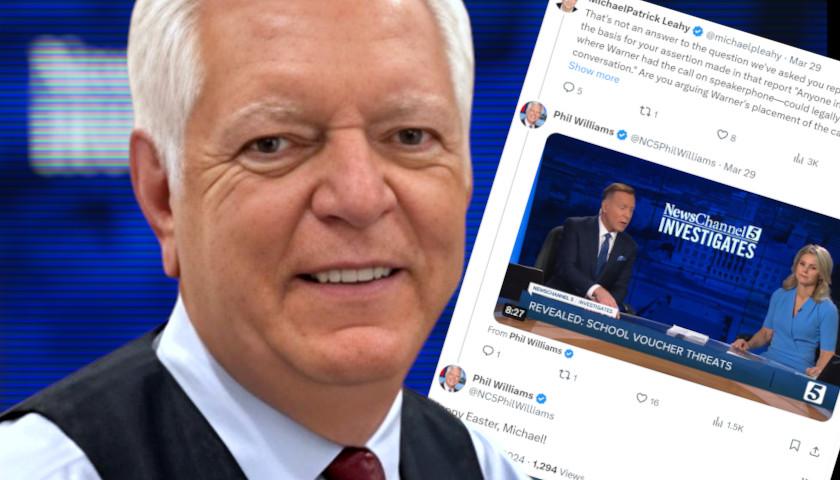Live from Music Row, Wednesday morning on The Tennessee Star Report with Michael Patrick Leahy – broadcast on Nashville’s Talk Radio 98.3 and 1510 WLAC weekdays from 5:00 a.m. to 8:00 a.m. – host Leahy welcomed Director Todd Myers of the Center for the Environment in Washington, D.C. to the newsmaker line to discuss his new book, Time to Think Small, which explains how individuals can do more for the environment than government.
Leahy: We are joined on our newsmaker line right now by Todd Myers, director of the Center for the Environment at the Washington Policy Center and author of Time to Think Small, which is a new book.
It talks about how basically nimble new environmental technologies can solve the planet’s biggest problems. Welcome, Todd. Thanks for joining us this morning.
Myers: Yes, thanks for having me on.
Leahy: You’re based in the Seattle, Washington area, correct?
Myers: I am, yes. So I live in Washington State. I actually live in the mountains because I prefer to be out in nature. But yes, we are in Washington.
Leahy: Are you out there now?
Myers: No, I’m actually in Washington D.C. meeting with members of Congress and other folks.
Leahy: Yes, I was going to say, because if you were out there, you’d have gotten up at, like, it’s 4:16 Pacific time, so pretty early out there, isn’t it? But you’re here on the D.C. side. So tell us about your book.
Now, Washington Policy Center, it’s a free-market think tank in the state of Washington. Boy, that must be must be quite a challenge out in the blue state of Washington to be a part of a free-market think tank.
Myers: Yes, as a conservative environmentalist in Washington state, I do drink a lot. But what my book is about is that what I see after 20 years of working in environmental policy is that the policies that truly work to help the environment and to protect the things that everybody cares about, conservatives and people on the Left, are market-based, innovative individual solutions.
And top-down government often fails to solve environmental problems. And I think this is critical for conservatives to understand, because you look at a state like Tennessee, and a state like Washington where conservatives live, they live in the parts where there’s nature.
And so they, everyday, live environmental stewardship. But they’re nervous about environmental politics because they’re afraid that the minute they say they care about the environment, it means that they’re committing themselves to sort of big government and socialist policies and they don’t want that.
Leahy: The Green New Deal and all this climate-change industrial complex. Look, I’m shocked, I’m shocked. I’ve been reading all the legacy media. I thought conservatives hated the environment and wanted pollution all over the place.
Myers: Well, that’s what you would certainly think, but I just tell people to look at a political map and where are the red parts and where are the blue parts. The blue parts are where we’ve paved over nature with concrete and asphalt and the red parts are where people tend to vote for Republicans or where nature is.
But I have to say the conservatives sometimes sound like we don’t care about the environment. And I understand that because we worry that if we say that we are concerned about protecting species and wildlife and other things like that, that it feeds into the Green New Deal, and we don’t want to do that.
So that’s what my book is about, is a way to say, no, here’s a better approach that does more for the environment and the things that we care about in the environment without committing to those big government approaches.
Leahy: Give me an example of thinking small, and in a nimble environmental technology that’s addressing environmental issues.
Myers: I’ll give you a really great one on my favorite example, which is that people tend to talk about climate change, but there are lots of other issues, and one of them is plastic in the ocean. And so there’s a lot of a growing amount of plastic and trash in the ocean.
Nobody wants that. But the United States doesn’t contribute very much. Mostly it’s developing countries. And so that’s where you have to go to solve the problem. So a group called Plastic Bank actually pays people to pick up plastic on the beach.
They can say, here’s where I picked it up because of the GPS on their smartphone, because more than 90 percent of people in developing countries have smarter cellphones. They turn it in to Plastic Bank.
Plastic Bank pays them on their cellphone, because a lot of these people don’t have banks. And then Plastic Bank recycles the plastic and sells it to SC Johnson. So when you go and you buy a Windex bottle, it’ll say, made with ocean-bound plastic.
Now, the technology involved in this is just a cellphone. It’s nothing very special. And yet they have collected more than 3.1 billion plastic bottles that would have washed into the ocean, and more than 140 million pounds of plastic.
It shows the power of lots of small individual efforts. Not a top-down government program, but a bottom-up effort from small efforts that are making the difference. And that, I think, is something we can apply in so many environmental areas that, again, doesn’t rely on that big government approach.
Leahy: The book is Time to Think Small, and the subtitle is How Nimble Environmental Technologies Can Solve the Planet’s Biggest Problems. The author, our guest, Todd Myers, with the Washington Policy Center.
Let’s talk about the environment and the Green New Deal industrial complex. Let me see if I’ve got this right. My understanding is, if you talk to most scientists, that the planet has been warming over the past 100 years. I guess the studies show it has increased in temperature. Average temperature on the planet has increased by about two degrees, I can’t remember if it’s Fahrenheit or centigrade, over the past 100 years, but that most many scientists say it is. Man’s production of carbon dioxide through the burning of fossil fuels has had very little, if any, impact on that temperature increase. Do I have that right, or what’s the story on that?
Myers: Well, I think that what most scientists will say is that CO2 does trap heat in the atmosphere. Where we get into the fight is how much, and how much of a role humans play. But what I like to focus on, rather than fighting about those details because of politics …
Leahy: Oh, come on! Don’t you just love fighting about those details?
I hate the Green New Deal.
I love the Green New Deal.
You’re evil.
You’re an idiot.
Don’t you love that conversation?
Myers: Well, I don’t really, because it doesn’t really help the environment.
Leahy: I know. Who are destroying works of art to show how much they care. That’s not productive.
Leahy: What is it that some crazy people in Europe are going, like, they’re defacing Van Gogh, and I don’t see the connection.
Myers: Well, exactly. And what they’re trying to do is to say that they care about the environment. They don’t care about the environment. And if you create hysteria around climate change, that’s what you get, and that’s not productive.
But there are lots of things that we can do to save energy and have the side benefit of reducing CO2 emissions, no matter how serious you think it is. So, for instance, one of the small environmental technologies I talk about in my book is a thing called a sense monitor.
It sits in my electrical box and it determines and it reads the electricity in my house a million times a second and can tell me what appliances I’m using and how I’m using electricity so that I can save money.
And look, I’m an energy geek. I’ve worked in this for a long time, and I was surprised at some of the ways that I was using electricity. And I changed those things and I saved the money.
Now, does it matter whether it reduces CO2 emissions or not? No, I’m saving money. And so that’s the beauty. That’s why these things work, is that they align personal incentives with the environment.
Whereas government programs, programs tend to punish you if you don’t do what they want. These technologies reward you for doing more with less and saving money. And that is such a better way to help the environment than sort of the heavy stick of government.
Listen to today’s show highlights, including this interview:
– – –
Tune in weekdays from 5:00 – 8:00 a.m. to The Tennessee Star Report with Michael Patrick Leahy on Talk Radio 98.3 FM WLAC 1510. Listen online at iHeart Radio.
Photo “Todd Myers” by Washington Policy Center.








